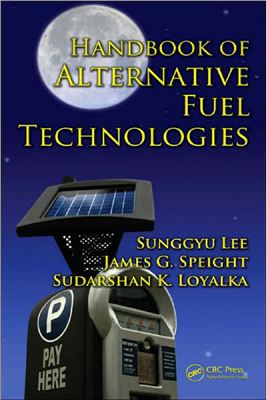CRC, 2007. - 568 Pages.
In addition to enabling a clean and energy efficient future, alteative fuel sources are fast becoming a necessity for meeting today's growing demands for low-cost and convenient energy. The Handbook of Alteative Fuel Technologies offers a thorough guide to the science and available technologies for developing alteatives to petroleum fuel sources and petrochemical feedstocks. This handbook focuses on the different intermediates and raw material options that can generate energy output and products equivalent to conventional petroleum sources. It presents short-term options for clean alteative energy sources that complement the development of long-term sustainable energy infrastructures. Detailing the chemical processes for each technology, the text assesses the environmental impact, benefits, and performance of the various processes and fuel products. It also summarizes processing and transportation issues, safety conces, regulations, and other practical considerations associated with alteative fuels. After presenting a global energy overview, the book describes clean and alteative methods of producing liquid fuels, crude oil, syngas, and methanol from coal, coal slurry, natural gas, resids, oil sand bitumen, and oil shale. It details the chemical reaction mechanisms, biological processes, and unit operations for converting co, lignocellulosic materials, and biomass into alcoholic fuels. It also covers the processes and thermodynamics of converting various waste materials into energy. The final chapters discuss the science, benefits, and applications of geothermal energy, nuclear energy, and fuel cells. Blending up-to-date technical information with current trend analyses and feasible implementation strategies, the Handbook of Alteative Fuel Technologies provides an ideal foundation for scientists, engineers, and policymakers interested in developing alteative energy sources.
Global Energy Overview
Gasification of Coal
Clean Liquid Fuels from Coal
Coal Slurry Fuel
Liquid Fuels from Natural Gas
Resids
Liquid Fuels from Oil Sand
Shale Oil from Oil Shale
Methanol Synthesis from Syngas
Ethanol from Co
Ethanol from Lignocellulosics
Energy from Biomass Conversion
Energy Generation from Waste Sources
Geothermal Energy
Nuclear Energy
Fuel Cells
In addition to enabling a clean and energy efficient future, alteative fuel sources are fast becoming a necessity for meeting today's growing demands for low-cost and convenient energy. The Handbook of Alteative Fuel Technologies offers a thorough guide to the science and available technologies for developing alteatives to petroleum fuel sources and petrochemical feedstocks. This handbook focuses on the different intermediates and raw material options that can generate energy output and products equivalent to conventional petroleum sources. It presents short-term options for clean alteative energy sources that complement the development of long-term sustainable energy infrastructures. Detailing the chemical processes for each technology, the text assesses the environmental impact, benefits, and performance of the various processes and fuel products. It also summarizes processing and transportation issues, safety conces, regulations, and other practical considerations associated with alteative fuels. After presenting a global energy overview, the book describes clean and alteative methods of producing liquid fuels, crude oil, syngas, and methanol from coal, coal slurry, natural gas, resids, oil sand bitumen, and oil shale. It details the chemical reaction mechanisms, biological processes, and unit operations for converting co, lignocellulosic materials, and biomass into alcoholic fuels. It also covers the processes and thermodynamics of converting various waste materials into energy. The final chapters discuss the science, benefits, and applications of geothermal energy, nuclear energy, and fuel cells. Blending up-to-date technical information with current trend analyses and feasible implementation strategies, the Handbook of Alteative Fuel Technologies provides an ideal foundation for scientists, engineers, and policymakers interested in developing alteative energy sources.
Global Energy Overview
Gasification of Coal
Clean Liquid Fuels from Coal
Coal Slurry Fuel
Liquid Fuels from Natural Gas
Resids
Liquid Fuels from Oil Sand
Shale Oil from Oil Shale
Methanol Synthesis from Syngas
Ethanol from Co
Ethanol from Lignocellulosics
Energy from Biomass Conversion
Energy Generation from Waste Sources
Geothermal Energy
Nuclear Energy
Fuel Cells

